



David Block is the Content and Curriculum Developer at Aleph Beta, where he creates material which is on the forefront of Jewish education and educational technology. He is a graduate of Yeshiva University, where he also received an MA in Jewish History and an MS in Education, and is now a doctoral candidate in YU's Azrieli School of Education, while finishing his ordination at YU’s theological seminary. David was a featured presenter at Limmud NY, where he shared his curriculum on teaching the Holocaust through music. David serves as guest rabbi and scholar-in-residence at the Jewish Center of Atlantic Beach, and served as Educational Director for NCSY. He served as Associate Director of and sang in the Maccabeats, co-wrote and co-produced viral hits, such as “Candlelight,” and has performed in hundreds of Jewish communities around the world.
 11:47
11:47
For the first time in a while, the main characters of this parsha are not the people of Israel. While the story of Bilaam and Balak are interesting, we wonder: the Torah isn’t an all-inclusive history book; why does the Torah tell us this story?.
Series: Aleph Beta: The Parsha Experiment
Rabbi David Block (31)
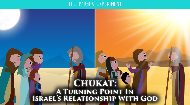 12:43
12:43
This week, we get even more complaining from Israel - this time, about the lack of water. How can they continue to complain after everything God had done for them? Join us as we explore the baffling story of Israel’s complaints.
Series: Aleph Beta: The Parsha Experiment
Rabbi David Block (31)
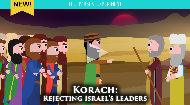 14:29
14:29
We’ve seen Israel complain over and over, but never before have they tried to undermine and dispose of their leaders. Join us as we make sense of Korach’s shocking complaints, this week on the Parsha Experiment.
Series: Aleph Beta: The Parsha Experiment
Immanuel Shalev (41)
 13:36
13:36
This week, we read about the tragic sin of the spies. It’s a very frustrating story. Every time we read it, just as the spies are about to give their report, we want to scream out, “NO - DON’T DO IT!” How could they have doubted God? How could they have sinned so egregiously?.
Series: Aleph Beta: The Parsha Experiment
Rabbi David Block (31)
 13:16
13:16
We've finally started traveling in the desert... and the people immediately complain? Did they suddenly forget that they had just been so close with God?? And how can we understand, and relate, to this seemingly ungrateful, chutzpadik nation?.
Series: Aleph Beta: The Parsha Experiment
Rabbi David Block (31)
 15:14
15:14
In Parshat Naso, we are introduced to what seems like a hodgepodge of miscellaneous laws. Why is the Torah bringing these up together? Join us as we explore something very subtle going on in this parsha.
Series: Aleph Beta: The Parsha Experiment
Rabbi David Block (31)
 14:08
14:08
Bamidbar should open with the stories of the desert, right? But instead, we are told of a census, the camp formation, and the Levites. Huh? Why is this the introduction to Bamidbar? In this week's video, we dive into the new role of the Levites, and see how it gives us a window into understanding our own responsibility, and our destiny.
Series: Aleph Beta: The Parsha Experiment
Immanuel Shalev (41)
 14:23
14:23
We suggested last week that death is the thread that ties the cases of tumah together. This week, in Metzora, we'll dive a little deeper to find the meaning embedded in the strange rituals of becoming tahor, ritually pure.
Series: Aleph Beta: The Parsha Experiment
Immanuel Shalev (41)
 11:16
11:16
In Parshat Tazria, we are introduced to the concepts of Tumah and Tahara. Some translate them as cleanliness and uncleanliness, some say ritual purity and impurity, but we never seem to get a clear and relevant understanding of what they actually are
Series: Aleph Beta: The Parsha Experiment
Immanuel Shalev (41)
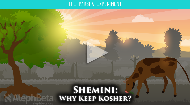 13:14
13:14
In this week's parsha, the Torah talks about one of the most impactful laws on the general lifestyle of the people of Israel - kosher animals. Have you ever considered WHY we're restricted from eating certain animals? And the specific laws - split hooves, chewing cud - seem totally arbitrary
Series: Aleph Beta: The Parsha Experiment
Immanuel Shalev (41)
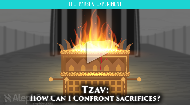 11:20
11:20
How can I, a modern day reader of the Torah, understand and relate to the concept of animal sacrifices, Korbanot? The ritual seems completely antiquated and barbaric to us today. And yet, Korbanot were a staple of Israel's service to God
Series: Aleph Beta: The Parsha Experiment
Immanuel Shalev (41)
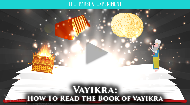 11:59
11:59
The book of Leviticus is tough - no narrative, and really difficult topics - for instance, how do we relate to holiness, purity and sacrifice in the 21st century? In this week's video for Vayikra (Leviticus 1:1-5:26), we will learn how to read the perplexing book of Leviticus.
Series: Aleph Beta: The Parsha Experiment
Immanuel Shalev (41)
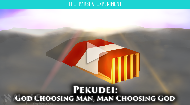 11:40
11:40
Parshat Pekudei (Exodus 38:21-40:38) is the conclusion of the book of Exodus. Exodus is known for Israel’s escape from Egypt, the sea splitting, the Ten Commandments, the Golden Calf, and the Tabernacle
Series: Aleph Beta: The Parsha Experiment
Immanuel Shalev (41)
 12:39
12:39
In Parshat Tetzaveh (Exodus 27:20-30:10), God goes to great lengths to explain each specific detail for the Mishkan's structure and design. Obviously the details are more than just a means for beautification - there must be deep and meaningful significance for us all
Series: Aleph Beta: The Parsha Experiment
Immanuel Shalev (41)
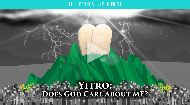 12:30
12:30
In Parshat Yitro (Exodus 18:1-20:23), we just witnessed some majorly epic events: the 10 plagues, the splitting of the sea and we're about to witness the ultimate epic event: God's revelation at Sinai. But smack in the middle of all of this awesomeness, we're introduced to Yitro, Moses' father-in-law
Series: Aleph Beta: The Parsha Experiment
Immanuel Shalev (41)
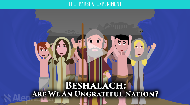 10:53
10:53
In Parshat Beshalach (Exodus 13:17-17:16) we're introduced to a nation of whiners and complainers. After years of slavery, the Israelites are finally a free nation! The next thing we should be reading is a love story between God and His people. But the honeymoon phase ends before it even begins
Series: Aleph Beta: The Parsha Experiment
Immanuel Shalev (41)
 12:38
12:38
In Parshat Bo (Exodus 10:1-13:16) we're finally freed from years of slavery! Mazal Tov! But before we get to the triumphant splitting of the sea, we read a whole section of laws relating to firstborn children and animals. Wait, what?! Can’t this wait until we're across the Sea?? Whats the deal with these laws and what can they teach us about the true meaning of the Exodus?.
Series: Aleph Beta: The Parsha Experiment
Immanuel Shalev (41)
 12:54
12:54
Epic speeches inspire us, but what if you're hearing the same epic speech over...and over...and over? That's what we seem to hear in God's speech to Moses in Parshat Va'era (Exodus 6:2-9:35)
Series: Aleph Beta: The Parsha Experiment
Immanuel Shalev (41)
 13:10
13:10
Everyone loves a good origin story - how did Anakin Skywalker become Darth Vader? Who was Peter Parker before Spiderman? In this video for Parshat Shmot (Exodus 1:1-5:23), we focus on Moses --- who was he before God appointed him as leader? How did Moses become Moses?.
Series: Aleph Beta: The Parsha Experiment
Immanuel Shalev (41)